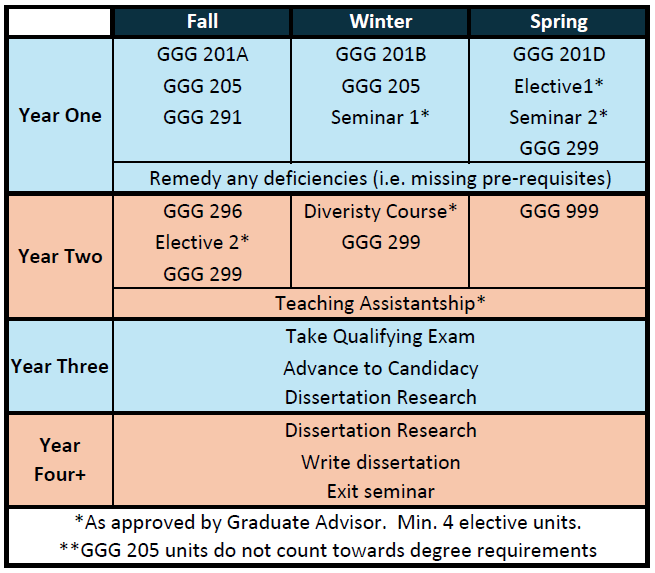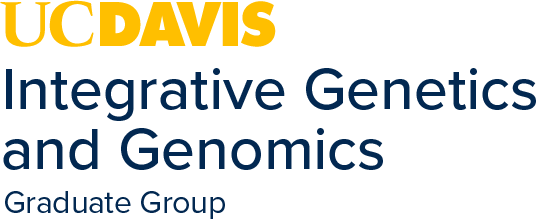Ph.D. Program
The Ph.D. degree is a research degree with specialized education in a particular discipline of genetics or genomics.
Normally a student will complete course and teaching requirements during the first two years of the program, pass an oral Qualifying Examination given by four faculty members, then conduct and complete the dissertation research under the direction of a major professor, who serves as a research mentor. A dissertation committee approves the dissertation, and the student delivers an exit seminar on this work to the graduate group to complete the degree. Full-time students must enroll in a minimum of 12 units per quarter.
Read the full degree requirements here.
Course Requirements
- Core Courses in Genetics and Genomics (GGG 201A, 201B, 201D)
- History of Genetics (GGG 291)
- Science Professionalism and Integrity (GGG 296)
- Seminars (GGG 290A + 1 additional seminar unit* as approved by academic advisor)
- Dissertation Electives* (two letter-graded courses of 2+ units each; one elective must be graduate-level)
- Diversity in Educational Experience* (one graduate level course, ex: GGG 290X)
*Must be approved by faculty academic advisor
Rotations
Rotations are encouraged but not required. Ph.D. students may enter the IGG committed to a specific faculty member or may enter unassigned and rotate through three or four laboratories during their first two quarters prior to deciding on a faculty sponsor. If a student enters uncommitted, then they must enroll in two quarters of GGG 205.
Teaching Requirement
All Ph.D. students must serve as teaching assistants (TAs) in one appropriate genetics-related lecture or laboratory course prior to advancing to candidacy.
Qualifying Exam
A qualifying exam is required to determine your competence in genetics and genomics as a whole and your chosen area of specialization. Qualifying Exams should be taken at the start of Year 3 of the PhD program.
Designated Emphases
Ph.D. students have the option of participating in the Designated Emphasis programs in Biophotonics & Bioimaging, Biotechnology, Reproductive Biology, or Translational Research, Students should decide on participation in their first year, and participants are required to have a faculty representative from their elected Designated Emphasis on their Qualifying Examination committee. Students MUST join DEs prior to taking their QE.
Research and Dissertation
The doctoral dissertation, an original research project in genetics/genomics, must be completed under the guidance of a major professor who is a member of the Integrative Genetics and Genomics Graduate Group. A dissertation committee composed of the major professor and two or three other faculty members provides guidance and approves the completed dissertation.
Exit Seminar
IGG students are required to present an Exit Seminar. The Exit Seminar is a formal public presentation of the student’s research before the program faculty and students. The Dissertation Committee will not sign the Dissertation until after the exit seminar has taken place.
Sample PhD Timeline

M.S. Program
IGG typically does not admit students directly into the MS program. MS applications should seek a faculty sponsor before applying to the program.
The programs for the Master of Science degree are designed to provide in depth training in either Cellular or Systemic Physiology. Full-time students must enroll in a minimum of 12 units per quarter. Students must select either Plan I or Plan II of the M.S. Program as soon as possible:
Plan I: thesis track
Plan II: coursework and comprehensive exam track
Learn more about the differences between Plan I and Plan II in the full degree requirements.
Course Requirements
A minimum of 30 (Plan I) or 36 (Plan II) units in genetics/genomics or related subjects is required. Check full degree requirements for more information.
- Core Courses in Genetics and Genomics (GGG 201A, 201B, 201D)
- Science Professionalism and Integrity (GGG 296)
- Seminars (GGG 290A + 1 additional seminar unit* as approved by academic advisor)
- Electives* (11+ units)
- Plan II only: Research electives (GGG 298/299) + 10 page research report (due to exam committee)
*Must be approved by faculty academic advisor
Plan I Research and Thesis
A research program and thesis must be completed under the guidance of a major professor (a research mentor) who is a member of the graduate group. At least two other faculty members assist the major professor as members of the thesis committee. The M.S. thesis should be a scholarly piece of experimental research that is rigorous in design, methodology and analysis, but is not expected to be as extensive as a Ph.D. dissertation.
Plan II Comprehensive Exam
The Master's Comprehensive Examination is an oral exam conducted by a committee of at least three members. The student will be tested on the genetics and genomics concepts taught in the core courses. Plan II is the 'Course Option' and is best suited for students who would like more coursework than research units to gain current knowledge of genetics for positions in education, policy, journalism, etc.
Detailed Comprehensive Examination Information
Comprehensive exam committee: The comprehensive exam committee is appointed after the student submits an application to candidacy to the M.S. degree. It consists of a Chair (the student's faculty mentor) and two additional members, one of whom must also be a member of the GGG. Suggestions for the membership of the examination committee may be made by the guiding committee, but the Advising Committee of the GGG will have final responsibility for selecting the committee.
Timing – The comprehensive examination committee is appointed after the student submits an Application for Candidacy to the M.S. degree, Plan II, no later than the 5th quarter in residence. It is recommended that students advance to candidacy at the end of the third quarter and can submit this form whenever more than 50% of course units are completed.
Outcome – Fulfillment of the Comprehensive Examination is the last requirement of the M.S. Plan II. A student may take the comprehensive exam once they have advanced to candidacy. However, it is important that the capstone requirement be completed at or near the end of the coursework for the Master's degree; for most students, the exam is taken at the end of the 5th quarter.
The comprehensive examination requirement will cover those areas of General Genetics included in the coursework completed by the student. The Chair of the comprehensive examination committee for Plan II students shall report the results of the examination to the GGG office (Program Coordinator) and to the Office of Graduate Studies. In addition to the oral comprehensive examination, Plan II students will submit a 10-page scientific paper for approval by the examination committee. The subject of the paper will be by mutual agreement of the Chair of the examining committee and the student.
The Exam committee's unanimous vote is required to pass a student on the exam. If a student does not pass the exam, the committee may recommend that the student be reexamined one more time, but only if the Graduate Advisor concurs with the committee. The second exam must take place within one quarter of the first exam. The format of the second exam is the same as that of the first exam and may include the submission of an amended version of the report. The examination may not be repeated more than once. A student who does not pass on the second attempt is subject to disqualification from further graduate work in the program.
Once passed, the Master's Report form is signed by the Program Graduate Adviser and then forwarded to the Office of Graduate Studies. The deadlines for completing this requirement are listed each quarter in the campus General Catalog (available online at the website of the Office of Registrar or from the Bookstore). A candidate must be registered student or in Filing Fee status at the time the program submits the form, with the exception of the summer period between the end of the Spring Quarter and the beginning of Fall Quarter. The program must file the report with Graduate Studies within one week of the end of the quarter in which the student's degree will be conferred.
